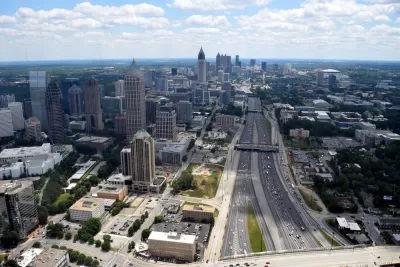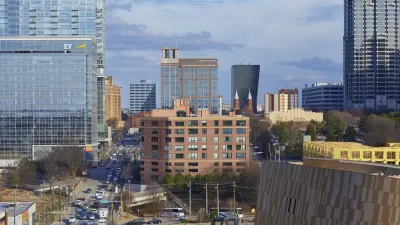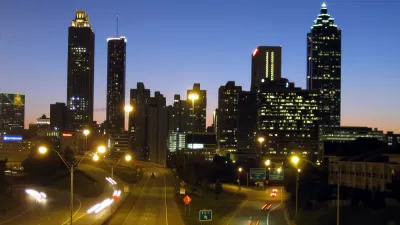Housing costs are rising in Atlanta, while available affordable housing has decreased. The Atlanta Housing Authority needs to ramp up construction after a lull in development.

Max Blau reports that Atlanta doesn’t have the affordable housing it needs, and the Atlanta Housing Authority now finds itself playing catch-up after not building new units for a number of years.
“From 2009 to 2016, the city permitted the construction of more than 25,000 new luxury apartments. But nearly all of Atlanta Housing’s 400-plus acres of undeveloped property stayed vacant,” says Blau. After the Great Recession, then-mayor Kasim Reed tangled with Renee Glover, head of the authority, and construction was delayed.
In 2016, the authority proposed Herndon Square, a mixed-use, mixed-income redevelopment project. Mayor Keisha Lance Bottoms, who took office this year, has pledged to put $1 billion into affordable housing.
Observers say the Atlanta Housing Authority is part of a larger affordable housing crisis in the city, but it is integral to closing the gap. “Georgia State sociology professor Deirdre Oakley believes the authority must get back to building—and fast. The longer the authority waits, she says, the more responsibility it holds for the lack of rentals for low-income residents,” reports Blau.
Blau also notes that the authority did start taking steps to address affordable housing:
Before she [Bottoms] took office, the Atlanta Housing board had already passed a policy to prioritize helping people who live in census tracts where new development threatens to displace them, including in neighborhoods adjacent to the BeltLine like West End, Pittsburgh, and Reynoldstown. Authority officials have also looked into acquiring or investing in affordable housing units currently operated by MARTA and the BeltLine.
In addition to the Herndon Square project, slated for completion in 2021, the authority has three other projects planned, including a redevelopment project at the Civic Center.
FULL STORY: Atlanta’s housing authority stopped building rental units for nearly a decade. Can it make up for lost time?

Planetizen Federal Action Tracker
A weekly monitor of how Trump’s orders and actions are impacting planners and planning in America.

San Francisco's School District Spent $105M To Build Affordable Housing for Teachers — And That's Just the Beginning
SFUSD joins a growing list of school districts using their land holdings to address housing affordability challenges faced by their own employees.

The Tiny, Adorable $7,000 Car Turning Japan Onto EVs
The single seat Mibot charges from a regular plug as quickly as an iPad, and is about half the price of an average EV.

San Diego Votes to Rein in “Towering” ADUs
City council voted to limit the number of units in accessory buildings to six — after confronting backyard developments of up to 100 units behind a single family home.

Texas Legislature’s Surprising Pro-Housing Swing
Smaller homes on smaller lots, office to apartment conversions, and 40% less say for NIMBYs, vote state lawmakers.

Even Edmonton Wants Single Staircase Buildings
Canada's second most affordable major city joins those angling to nix the requirement for two staircases in multi-family buildings.
Urban Design for Planners 1: Software Tools
This six-course series explores essential urban design concepts using open source software and equips planners with the tools they need to participate fully in the urban design process.
Planning for Universal Design
Learn the tools for implementing Universal Design in planning regulations.
Borough of Carlisle
Smith Gee Studio
City of Camden Redevelopment Agency
City of Astoria
Transportation Research & Education Center (TREC) at Portland State University
City of Camden Redevelopment Agency
Municipality of Princeton (NJ)





























